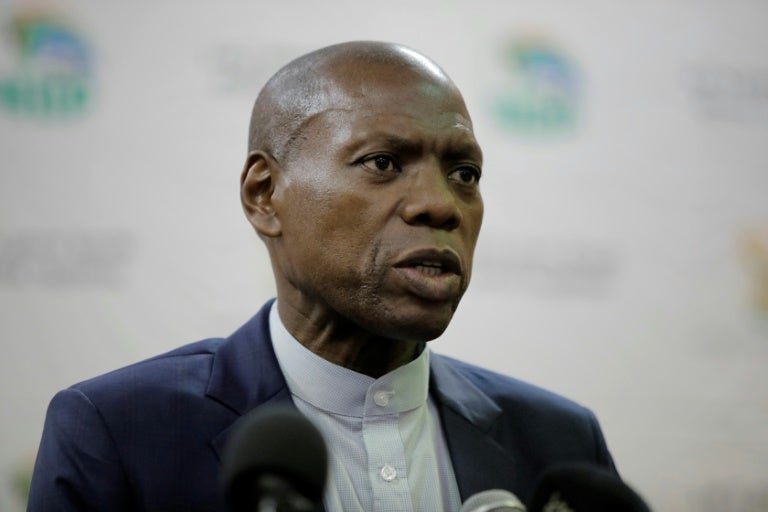Speaking at a briefing on Monday on the new coronavirus variant, Mkhize said there was some evidence that the second wave of infections was being brought under control.

Health Minister Dr Zweli Mkhize has remembered the more than 50,000 people who have lost their lives to Covid-19 during a webinar on 4 March 2021 hosted by the National Press Club and the GCIS. Picture: AFP/File/GUILLEM SARTORIO
Health Minister Dr Zweli Mkhize on Wednesday reiterated that the suspension of alcohol sales had eased pressure on the country’s health system amid the second wave of Covid-19 infections, saying his department had no regrets over the matter as the ban had been helpful.
“The suspension of alcohol reduced the preventable accidents which are linked to gunshots, attacks and stab wounds as well as motor vehicle accidents. The problem of having to compete with someone who’s going to bleed to death and someone whose health is deteriorating, it’s something that the medical practitioners and the health workers in general understand,” Mkhize said.
The minister was speaking during a media briefing in Limpopo after he conducted an oversight visit to various healthcare facilities in the province to assess their ability to deal with Covid-19 patients.
On 29 December, President Cyril Ramaphosa re-imposed the ban on booze sales under the amended level 3 lockdown regulations. The South African Breweries (SAB) has lodged an urgent application in the Western Cape High Court seeking to declare the prohibition unlawful, while the National Liquor Traders’ Council has raised concerns over the livelihoods of liquor traders and potential job loses in the industry.
ALSO READ: Questions over constitutionality of state of disaster
However, Mkhize said the National Coronavirus Command Council (NCCC) had no choice but to suspend alcohol sales in order to ease the burden on hospitals’ trauma units.
“We needed to make sure that the prioritisation of Covid is not disturbed by the competition from the avoidable trauma. It’s quite well demonstrated and it’s not only here, all the hospitals have indicated that they actually had a very peaceful and trauma-free Christmas and new year, particularly on New Year’s Eve.
“Whatever issues that arise around the suspension of alcohol, from the point of view of the health department, we’ve got no regrets. We want to say that it’s actually the one thing that is most considerate to the health workers,” Mkhize said.
Speaking at a briefing on Monday on the new coronavirus variant, the minister said there was some evidence that the second wave of infections was being brought under control due to the amended lockdown regulations. But he cautioned that it was too early to celebrate.
“I think it’s important that that message must go out and we are not saying people must stop drinking, we are simply saying, ‘we could not cope with too much pressure coming from trauma cases associated with the festive season if there were no restrictions’,” he said.
Mkhize said he was impressed by the level of confidence from health workers in dealing with Covid-19 patients, but he said a lot of them were complaining about exhaustion due to the pandemic.
“Having gone through the first surge [in infections], the burden that the whole continent was carrying was located in South Africa [and] we just had a second surge. It’s actually quite a huge amount of experience that they’ve gained and the level of confidence has also increased amongst them,” the minister said.
He added: “We were also assisted by these [lockdown] restrictions, but in particular, this exhaustion would have been far worse and we would have coped much less had we not actually instituted the suspension of the sale of alcohol, and therefore reduced the trauma-related admissions. That helped us to be able to focus on the patients with emergencies such as Covid-19.”
Mkhize thanked health workers for their sacrifices and said going forward his department would focus on ensuring that there is psychosocial support for workers including the reorganisation of work to give them some break in between shifts.
“And also basic motivation is important so that they know what they’re doing is worthwhile and that the whole country appreciates what they’ve done,” he said.
READ NEXT: Last day to comment on plans for total driver booze ban
For more news your way, download The Citizen’s app for iOS and Android.
Download our app




